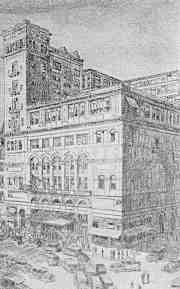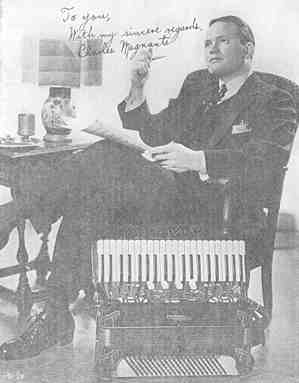 "Hope I'm not going to be a nuisance
coming for an interview just now," I said.
"Not at all," replied the star. "We've
been working steadily for nearly two
hours and are glad of an excuse to rest a
few minutes."
"Hope I'm not going to be a nuisance
coming for an interview just now," I said.
"Not at all," replied the star. "We've
been working steadily for nearly two
hours and are glad of an excuse to rest a
few minutes."  NEW YORK'S busy, exciting
thoroughfare of 57th Street
was teeming with the usual quota of auto
traffic and pedestrians as I made my way
to Carnegie Hall on a windy March afternoon. Arriving at my destination I found
the crowds even denser as passersby
stopped to read the giant billboards that
had just been posted in front of the building. They announced something that was
really news to the music world. "Coming Accordion Concert" the posters read;
and then there was the name "MAGNANTE" in letters a foot high. Magnante . . . the name was well known to
many who paused to read. They had
heard it over the radio countless times;
but as a Carnegie Hall artist -- this was an
astonishing discovery!
NEW YORK'S busy, exciting
thoroughfare of 57th Street
was teeming with the usual quota of auto
traffic and pedestrians as I made my way
to Carnegie Hall on a windy March afternoon. Arriving at my destination I found
the crowds even denser as passersby
stopped to read the giant billboards that
had just been posted in front of the building. They announced something that was
really news to the music world. "Coming Accordion Concert" the posters read;
and then there was the name "MAGNANTE" in letters a foot high. Magnante . . . the name was well known to
many who paused to read. They had
heard it over the radio countless times;
but as a Carnegie Hall artist -- this was an
astonishing discovery! Naturally I felt quite superior as I pushed through the crowds, for I bad been fully aware of the coming event. In fact my reason for being at Carnegie at that very moment was to witness a rehearsal of the Concert which is to be held the evening of April 18.
I stepped into the Hall quietly for the rehearsal had already begun. The Quartet was in action. They were playing Mendelssohn's "Rondo Capriccioso." I sank into an orchestra seat and immediately forgot the world outside in the beauty of these exquisite harmonies. They followed this number with Tschaikowsky's "Dance de Mirlitons" and then the music stopped as the artists paused to discuss some points.... I made my presence known. Charles Magnante greeted me with his cordial smile.

Gene von Hallberg, Joe Biviano and Abe Goldman assented vigorously to this, so I lost no time in firing some questions. "When did you first have the idea to give a concert of this nature?" I asked. "It has been my ambition for many years," said Mr. Magnante. "But I want to give full credit for the inspiration to my wife. It was she who first suggested that I, some day, give a concert of my own in this Hall where all the greatest musical artists of the world have appeared. It has meant a tremendous amount of ground work and preparation, but at last I feel we're ready."
"All the arrangements for the Quartet have been made by you personally or under your supervision, haven't they?" I inquired.
"That's right. And into that arranging went an almost unbelievable amount of work. You see," Mr. Magnante continued "preparation for an accordion concert is more difficult than any other for there is no library of music to choose from. The great masters wrote compositions for string quartets, not accordions! I went through the works of composer after composer, studying the scores thoroughly to find out whether they were interesting and adaptable for the accordion. I am satisfied that every number now on the program is really effectively played on our instruments."
"You certainly have the best of the talent in your ensemble," I commented, looking over at Messrs. Biviano, Goldman and von Hallberg, who, far from resting, were earnestly discussing a score.
"Yes, I have," Mr. Magnante exclaimed. "Each and every one of the boys has shown the greatest enthusiasm over this event and has not spared himself in working for it. You know, also, that Domenic and Anthony Mecca are to be on the program."
"Yes, you have an excellent variation planned, I can see. Solos, duet and quartet numbers."
"There is a variety of composers represented, too," said Magnante. "Bach, Mendelssohn; Lecuona; Chopin; Kreisler; Mozart; Beethoven; Rimsky-Korsakow; and Tschaikowsky. Then in the 'modern' group are Gershwin; Grofe; Forsythe; Frosini; Biviano and myself. . . . Incidentally, I think this is an unique idea, combining classic and modern numbers on one program. I am keenly interested to know what the New York music critics will think of it! At any rate, it will give them an opportunity to comment on which type of music they think best suited to the accordion. For my part, I think it is the perfect instrument for both types."
"We're with you there." I assured him. "By the way, do you know the seating capacity of Carnegie?" I asked, looking over the orchestra, up to the two elegant tiers of boxes and above them to C Balcony.
"Something like 3,000 people. And do you know that in spite of the great size of this Hall the softest note played on the stage can be heard in the most distant spot in the balcony? That is without benefit of amplifiers too! There is something almost mysterious about the acoustics of Carnegie. Great engineers have studied it, but none can find the secret of the successful construction from that point of View."
"Well, that sounds as if everyone of your audience will be in a good spot, no matter where they sit; and that's lucky, for I predict there is going to be a full House!"
I heard gentle but determined clearing of throats behind me and turned to find the bigger half of the Quartet looking decidedly impatient to reclaim their leader.
"All right, boys," I gave in without a struggle. "I know when I'm not wanted. But I'll be back," I warned them, "on the night of April 18!"
| 1939 Magnante Concert at Carnegie Hall: Part 3 |
| 1939 Magnante Concert at Carnegie Hall: Part 1 |
The Classical Free-Reed, Inc. staff gratefully acknowledges volunteer Brian O'Boyle who assisted in the production of this article, as well as Stanley Darrow and his comprehensive American Accordion Musicological Society library.
| Invitation to Contributors / Submission Guidelines |
| Back to The Free-Reed Journal Contents Page |
| Back to The Classical Free-Reed, Inc. Home Page |